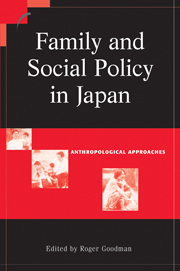Book contents
- Frontmatter
- Contents
- List of Illustrations
- Acknowledgements
- Contributors
- A note to the reader
- 1 Anthropology, policy and the study of Japan
- 2 Toward a cultural biography of civil society in Japan
- 3 Pinning hopes on angels: reflections from an aging Japan's urban landscape
- 4 Reproducing identity: maternal and child healthcare for foreigners in Japan
- 5 State, standardisation and ‘normal’ children: an anthropological study of a preschool
- 6 Child abuse in Japan: ‘discovery’ and the development of policy
- 7 Touching of the hearts: an overview of programmes to promote interaction between the generations in Japan
- 8 Death policies in Japan: the state, the family, and the individual
- 9 Embodiment, citizenship and social policy in contemporary Japan
- Index
9 - Embodiment, citizenship and social policy in contemporary Japan
Published online by Cambridge University Press: 05 July 2014
- Frontmatter
- Contents
- List of Illustrations
- Acknowledgements
- Contributors
- A note to the reader
- 1 Anthropology, policy and the study of Japan
- 2 Toward a cultural biography of civil society in Japan
- 3 Pinning hopes on angels: reflections from an aging Japan's urban landscape
- 4 Reproducing identity: maternal and child healthcare for foreigners in Japan
- 5 State, standardisation and ‘normal’ children: an anthropological study of a preschool
- 6 Child abuse in Japan: ‘discovery’ and the development of policy
- 7 Touching of the hearts: an overview of programmes to promote interaction between the generations in Japan
- 8 Death policies in Japan: the state, the family, and the individual
- 9 Embodiment, citizenship and social policy in contemporary Japan
- Index
Summary
Citizenship and national belonging
The Japanese citizen, the male citizen, the heterosexual citizen, the white-collar citizen, the fertile citizen, the able-bodied citizen: perhaps these phrases seem tautological, too obvious even to mention. What if we were to look at the obverse of these obvious and tautological phrases? What of the alien citizen, the female citizen, the homosexual citizen, the lesbian citizen, the trans-sexual citizen, the prostitute citizen, the infertile citizen, the disabled citizen? Are these phrases also tautological, or rather oxymoronic and contradictory? To what extent are these diverse kinds of citizens thinkable in modern Japan? What can we learn about citizenship in modern Japan by attempting to think through the gaps between the obviousness of the first group of phrases and the strangeness of the second group? The difference between the pairs of phrases above rests on the concept of embodiment. In this chapter, I will focus on how our understanding of citizenship might be transformed if we were to focus on citizens as embodied individuals.
Citizenship may be discussed in the context of the legal and institutional structures which determine who has the right to participate in the political systems of voting and elected governments and the duties which are linked with these rights: the liability for taxation, or in some countries the requirement that men perform military service. From this point of view, Japan apparently has one of the most liberal constitutions in the post-war world, guaranteeing rights to work, choice of domicile, choice of religion, freedom of assembly and association, and freedom from discrimination on the grounds of sex, race, status, religion or family origin to those who belong to the category of Japanese citizen (Article 14, Constitution of Japan, in Tanaka and Smith 1976).
- Type
- Chapter
- Information
- Family and Social Policy in JapanAnthropological Approaches, pp. 200 - 229Publisher: Cambridge University PressPrint publication year: 2002
- 21
- Cited by



